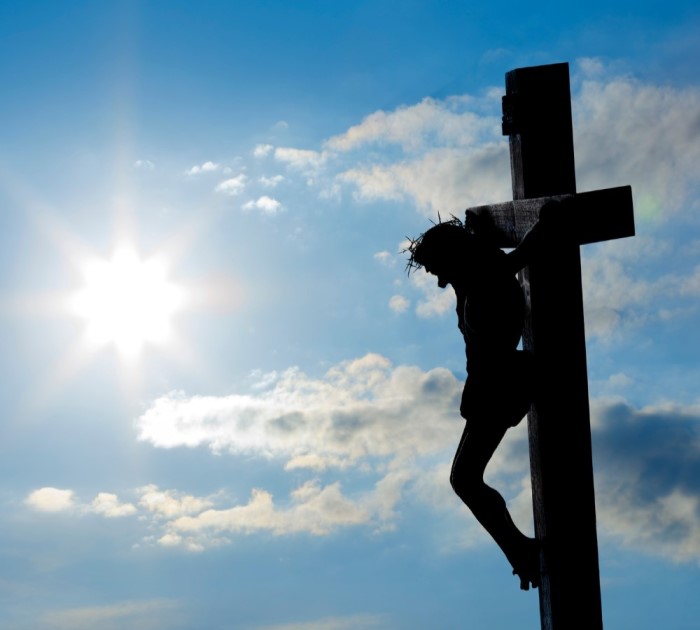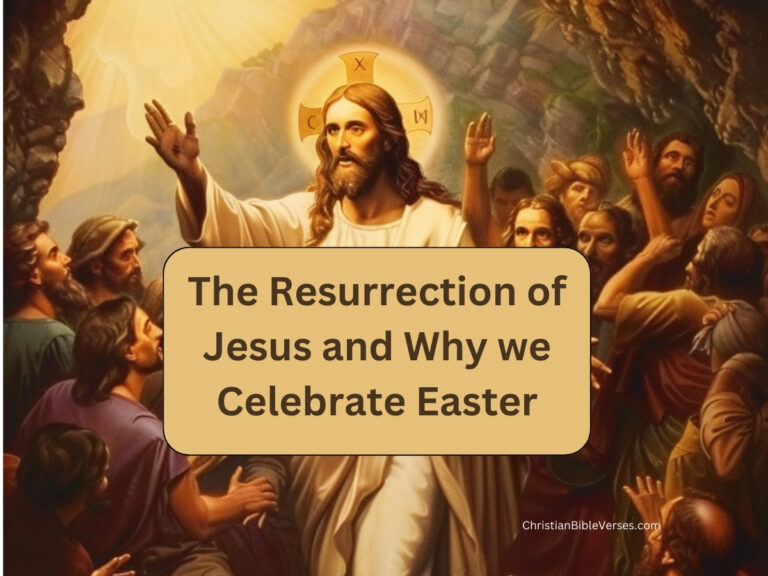Understanding Why Jesus Died for Us: Explaining His Sacrifice

The death of Jesus on the cross is a central event in the Christian faith. It is a historical fact that has been documented and analyzed for centuries. For Christians, the death of Jesus represents the ultimate sacrifice and the ultimate act of love.
The importance of Jesus’ death on the cross lies in its theological significance. According to Christian doctrine, Jesus’ death was necessary for the forgiveness of humanity’s sins. The idea is that Jesus, as the Son of God, took on the sins of humanity and paid the price for them through his death. This act of sacrifice made it possible for humans to be reconciled with God and to have eternal life.
His crucifixion is also significant because it represents the triumph of good over evil. Jesus’ death was a victory over sin and death, and it paved the way for the resurrection and the promise of eternal life. For Christians, the cross is a symbol of hope and salvation, and it serves as a reminder of the sacrifice that Jesus made for humanity.
God loved humanity so much that he gave the most important thing he could to us. He gave his own son even knowing that he would suffer a horrible death and be turned on by his trusted followers.
Why Jesus Needed to Die in the First Place
According to Christian belief, the death of Jesus Christ on the cross was a necessary sacrifice for the forgiveness of sins and the salvation of humanity. The core of this belief lies in the concept of sin and its consequences, as well as God’s justice and mercy.
In the biblical narrative, sin entered the world through the disobedience of Adam and Eve, separating humanity from a perfect relationship with God. The consequences of sin are not only physical death but also spiritual separation from God, who is perfect and holy. This separation required a solution that could bridge the gap between sinful humanity and a righteous God.
We believe that God, in His infinite love and mercy, provided a way for humanity to be reconciled to Him through the sacrificial death of Jesus Christ, who was fully God and fully man. As a sinless and perfect being, Jesus was able to take upon Himself the penalty for sin, which is death (Romans 6:23). His death on the cross is seen as a substitutionary sacrifice, where He paid the price for the sins of humanity.
The necessity of this sacrifice is rooted in the belief that God’s justice demands that sin be punished, and His holiness requires a perfect sacrifice. If God were to simply forgive sin without any consequence, it would violate His justice and undermine His holy character. The death of Jesus on the cross is believed to have satisfied God’s justice, allowing Him to extend forgiveness and salvation to those who place their faith in Christ.
Additionally, the resurrection of Jesus three days after His crucifixion demonstrated His victory over sin and death, providing the assurance of eternal life for those who believe in Him. The cross and the resurrection are seen as the central events that made it possible for humanity to be reconciled to God and experience eternal life.
Basically, the punishment for man’s sins was real and forever death. Jesus died to fulfill this debt we owed to God. Because of this, we now get to live forever in the Kingdom of Heaven.
John 3:16 “For God so loved the world that he gave his one and only Son, that whoever believes in him shall not perish but have eternal life.” NIV
Fulfillment of Prophecy
The death of Jesus on the cross is also seen as the fulfillment of prophecy. In the Old Testament, there are numerous prophecies that foretell the coming of a Messiah who would save humanity. Christians believe that Jesus is the fulfillment of these prophecies and that his death on the cross was a necessary part of his mission to save humanity.
The sacrifice of Jesus holds significant theological importance for Christians. It is seen as a sacrifice made for the salvation of humanity and as the fulfillment of prophecy.

Roman Crucifixion Practices
Crucifixion was a common form of execution in the Roman Empire, used for those who were considered the worst of criminals. The practice was designed to be a slow and painful death, which would serve as a warning to others who might consider committing similar crimes. The victim was usually stripped naked and then tied or nailed to a wooden crossbeam, which was then raised and affixed to a vertical stake. The weight of the body caused the victim’s arms to be pulled out of their sockets, making it difficult to breathe. Death could take several hours or even days.
Jewish Expectations of the Messiah
In Jewish tradition, the coming of the Messiah was expected to signal the end of the world as it was known. The Messiah was believed to be a powerful leader who would restore the glory of Israel and bring about a new era of peace and prosperity. Many Jews believed that the Messiah would be a military leader who would overthrow the Roman oppressors and establish a Jewish kingdom. However, Jesus did not fit this mold. He was a humble teacher who preached a message of love and forgiveness, not one of violence and conquest.
Despite this, Jesus gained a large following among the people of Judea, who saw in him the potential for a new kind of leadership. This made him a threat to the Roman authorities, who saw any potential rebellion as a danger to their power. Jesus was arrested and tried by the Roman authorities, who found him guilty of sedition and sentenced him to death by crucifixion.
The historical context surrounding the death of Jesus is complex and multifaceted. The Roman practice of crucifixion was designed to be a slow and painful death, while Jewish expectations of the Messiah did not align with Jesus’ message of love and forgiveness. Despite this, Jesus was seen as a threat to the Roman authorities and was ultimately executed as a result.
Christian Observances
The crucifixion of Jesus is a central event in Christian theology, and it is commemorated in a number of Christian observances. One of the most important of these is Easter, which celebrates the resurrection of Jesus following his crucifixion. Good Friday, the day on which Jesus was crucified, is also an important observance for many Christians. These observances serve as a reminder of the sacrifice that Jesus made for humanity and the hope that his resurrection brings.
Influence on Art and Literature
The symbol of Jesus on the cross has also been a popular subject in art and literature throughout history. Many famous works of art, such as Michelangelo’s “The Crucifixion of St. Peter” and Caravaggio’s “The Entombment of Christ,” depict the crucifixion in vivid detail. In literature, the crucifixion has been a popular theme in works such as “The Passion of the Christ” by Anne Catherine Emmerich and “The Last Temptation of Christ” by Nikos Kazantzakis.
The impact of the death of Jesus on the cross can also be seen in the symbolism that has been associated with it. The cross has become a powerful symbol of Christianity, representing the sacrifice that Jesus made for humanity. It is often used as a symbol of hope and redemption, and it can be seen in everything from jewelry to church architecture.
Spiritual Growth
The death of Jesus has immense spiritual significance for Christians. It is believed that Jesus died for the sins of humanity and his death opened the doors to salvation. This belief has helped countless individuals find solace and hope in times of distress.
Jesus’ death also serves as a reminder of the importance of forgiveness and compassion. Christians are encouraged to follow Jesus’ example and forgive those who have wronged them. This can be a difficult task, but it is essential for spiritual growth.
Ethical Implications
The death of Jesus has ethical implications as well. It is a reminder of the importance of living a life of integrity and honesty. Christians are called to live a life that is pleasing to God and to treat others with respect and kindness.
His death also highlights the importance of social justice. Christians are called to fight against oppression and to stand up for those who are marginalized. This is an essential part of living a life that is pleasing to God.
In Conclusion
The death of Jesus on the cross holds great significance for Christians around the world. Through his death, Jesus paid the ultimate price for the sins of humanity, providing a path to salvation and eternal life. It also became the motivation behind the entire Christian religion.
Jesus’ crucifixion also served as a demonstration of God’s immense love for humanity, as he willingly sacrificed his own life to save others. This act of selflessness and compassion is a powerful reminder of the importance of putting others before oneself and living a life of service to others.
Overall, the death of Jesus on the cross is a cornerstone of the Christian faith, representing the ultimate sacrifice and a powerful message of love, hope, and redemption.
Featured Book
This is a great book (8 fantastic stories) if you are interested in Christianity. Christianity, God Explained plus fun stories. I’ve read it several times, especially The Great Divorce.







